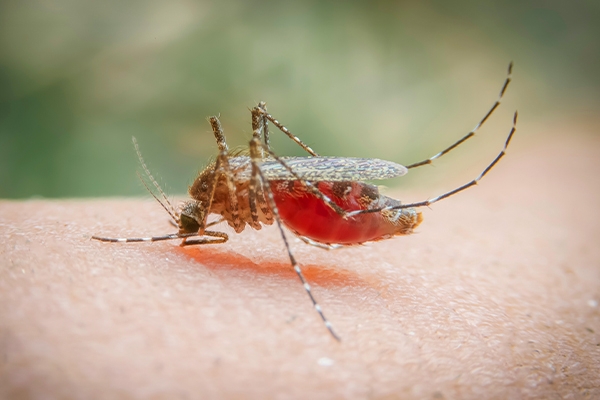Beware of Malaria: An Old Disease That Still Lurks

Indonesia is one of the countries most affected by malaria. According to the 2022 Current Malaria Situation in Indonesia, there were 443,530 cases of malaria, with 89% originating from Papua Province.
Malaria is a severe infectious disease, and it does not only occur in Indonesia. More than 50,000 world tourists have contracted malaria while traveling to endemic countries, such as most of Central and South America, Haiti, the Dominican Republic, Africa, India, Southeast Asia, and the Middle East.
Not spread through coughing—here’s how malaria spreads
Malaria, unlike the flu or a cough, is caused by a parasite known as Plasmodium, which is transmitted through the bite of a female Anopheles mosquito.
When the mosquito bites an infected person, it carries the parasite inside its body. About a week later, the parasite is transferred to the mosquito’s saliva and is ready to be “transferred” to the next person it bites.
Once inside the human body, the parasite travels to the liver and begins to multiply. It then enters the bloodstream, infecting and destroying red blood cells. This process is what causes the typical symptoms of malaria, such as fever, chills, and sweating, known as the Malaria Triad.
Anopheles mosquitoes are usually active at night, especially at dusk (5:00–7:00 p.m.) until dawn (5:00–6:00 a.m.).
Although the primary transmission of malaria occurs through mosquito bites, several other transmission routes are rare but still need to be monitored, for example, through blood transfusions, organ donations, sharing needles, or from an infected mother to her baby during pregnancy or childbirth.
Well, you also need to know that several types of Plasmodium can cause malaria, and each has different characteristics:
1. Plasmodium vivax
This type tends to cause milder symptoms, but the parasite can “hide” in the liver for months, even years, before reactivating and causing a relapse.
2. Plasmodium ovale
The infection is not particularly dangerous, but it still requires treatment. Just like P. vivax, this parasite can also live in the liver and cause a relapse. One of the effects is anemia.
3. Plasmodium malariae
Symptoms of malaria caused by this parasite usually appear long after the initial infection. The infection can become chronic, leading to kidney dysfunction.
4. Plasmodium falciparum
This is the most dangerous type. P. falciparum can cause serious complications, such as seizures, coma, and even death. This type is responsible for most cases of malaria deaths worldwide.
In Indonesia itself, the two most common types of parasites found are Plasmodium vivax and Plasmodium falciparum.
Malaria symptoms may not appear immediately

Symptoms usually appear 1 to 4 weeks after being bitten by a mosquito, but can also be felt up to 12 months later, mainly if caused by Plasmodium vivax.
Symptoms to watch out for include:
- fever and chills;
- nausea and vomiting;
- muscle pain;
- headache;
- fatigue;
- anaemia;
- yellowing of the skin and eyes (jaundice).
If not treated promptly, malaria can develop into a severe condition and even be fatal.
Just back from an endemic area? Get checked out immediately
If you have recently traveled to an area with a high incidence of the disease and are experiencing symptoms that are suspicious, please consult your doctor. Malaria diagnosis usually involves several tests:
- Microscopic examination of a blood smear is the most accurate test for detecting parasites and identifying the type of Plasmodium that is causing the infection.
- Rapid diagnostic tests (RDTs) can quickly detect malaria infection using antigens, although they cannot always accurately identify the species or number of parasites.
- Molecular tests (PCR): Help confirm the type of parasite in more detail, especially after results from a blood smear or rapid diagnostic test (RDT).
- Antibody tests: Show whether you have been infected with malaria in the past.
Effective ways to prevent malaria

If you are planning to travel to an endemic area, there are several essential steps you can take to protect yourself:
- Wear closed clothing: Choose long-sleeved shirts, long pants, and hats. Spray permethrin on your clothing for added protection.
- Apply mosquito repellent evenly, especially at dusk and night.
- Sleep under a mosquito net: If there is no screen on the windows or doors, use a mosquito net that has been sprayed with insecticide.
- Use preventive medication: If you are traveling to an area where malaria is endemic, take malaria preventive medication. Consult your doctor about medication options, such as chloroquine, primaquine, or Malarone. Medication should be taken before, during, and after travel.
- Avoid traveling while pregnant: Malaria during pregnancy can cause miscarriage, premature birth, or low birth weight.
Malaria prevention encompasses measures to control mosquito breeding sites, prevent mosquitoes from biting humans, eliminate adult mosquitoes, and eliminate malaria parasites in the body before they cause malaria.
In addition, in the residential environment, you can also play a role by doing:
- Drain the water reservoirs regularly.
- Close water containers tightly.
- Bury used items that have the potential to hold water.
- Spread Abate to eliminate mosquito larvae.
Malaria vaccine
A malaria vaccine is now available and can be given in four doses, starting at 5 months of age. The priority for this vaccine is children living in highly endemic areas, such as Papua. This vaccine is expected to be one of the pillars in the national malaria elimination effort.



